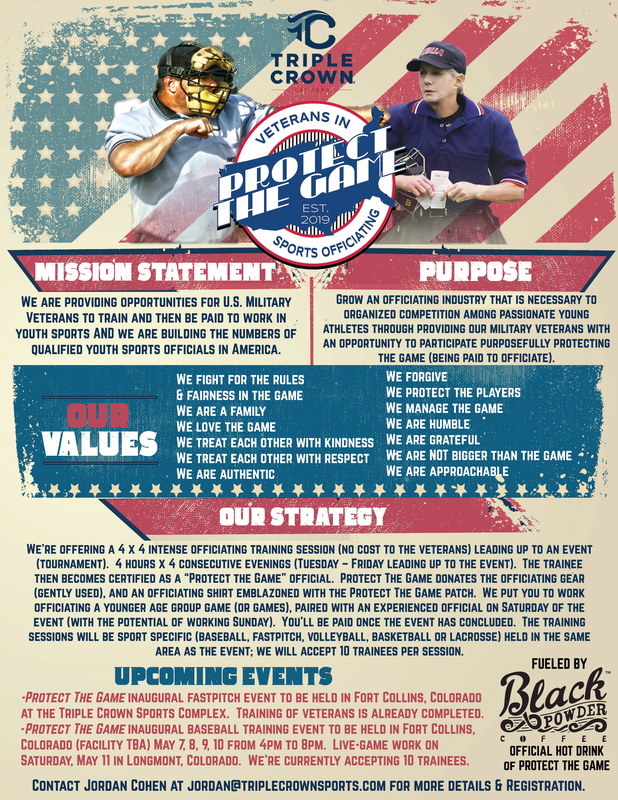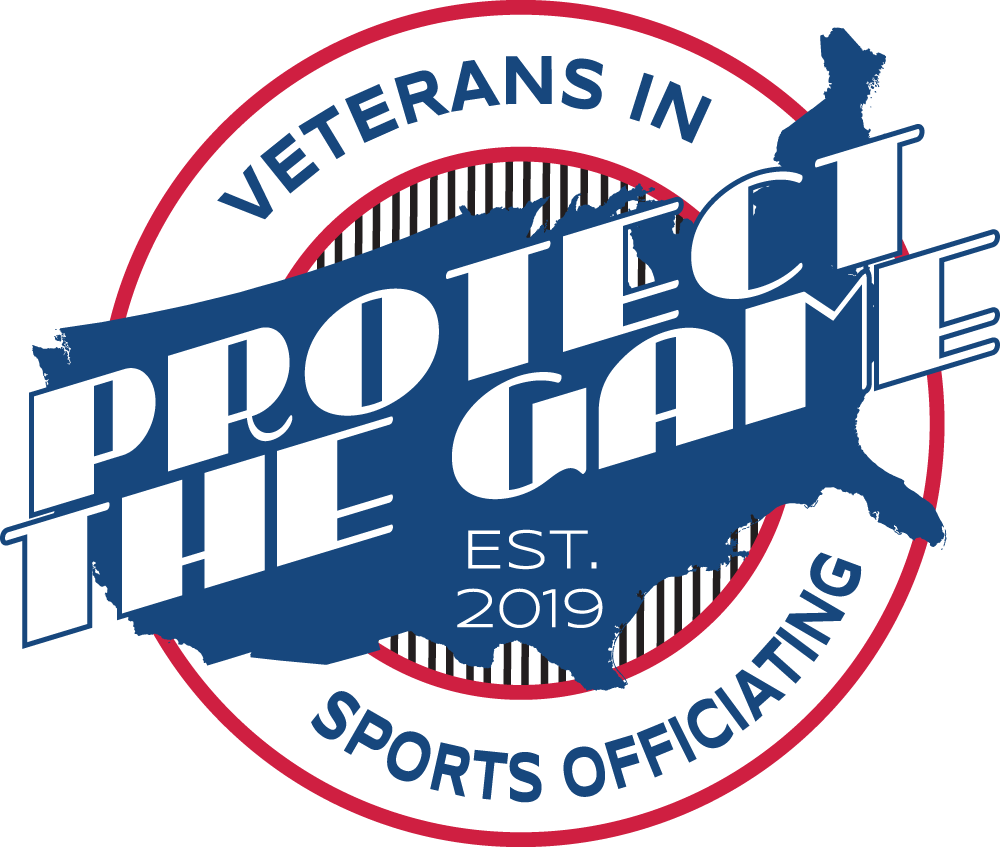|
At the start of 2019, the Protect The Game initiative was mostly a product of ideas, imagination and aspiration.
With ever-growing portions of the youth sports world feeling the pain of referee/official shortages, and the always pressing concerns about how to reintroduce military veterans to civilian life, Protect The Game began the year intent on pulling these two topics together. The idea took flight, where ex-military men and women would receive training on how to be a sports official – already possessing the skills to master and execute a rulebook, these veterans would also have the personality traits that could bring order and calm to sporting events that sometimes see players, parents and coaches respond with strong emotion. In November, PTG can look back with pride and say the Ed Jones Military Veterans as Sports Officials Training Center has taken root. Three separate certification sessions have been held at the center, based in the home office of Triple Crown Sports in Fort Collins, Colo. Ed Jones was in on the ground floor of Triple Crown Sports in the early 1980s, handling umpire assigning chores for slow pitch softball, and then transitioning to fastpitch as TCS moved in that direction. He attended Texas A&M and served in the military; his ashes are buried beneath home plate on the main field at TCS. Protect The Game is grateful for the progress enjoyed in 2019 and pleased to dedicate all the energy and effort to this point, and going forward, in the memory of Ed Jones. When Greg Wilson heard something that spoke to his heart, he spoke to someone right away to see how he could help.
Wilson calls Denver home and has two occupations – he’s an official with the National Football League, and he also work 1-4 days a week at Honig’s Gear for Sports Officials, which is located near Federal Blvd. and 6th Ave. In his travels, he caught wind of the Protect The Game initiative that was rolled out in 2019 and immediately connected with PTG’s mission of training veterans of military service to become certified officials in youth sports. Protect The Game has another training session set for prospective officials Oct. 25-27 at Triple Crown Sports. Triple Crown will also host a PTG Open House and Silent Auction from 5:30-8 p.m. Oct. 26, with current MLB umpire Chris Guccione as the featured speaker. After Wilson got everyone connected, Honig’s became the official uniform partner of Protect The Game and will be providing needed gear to officials as well as donating items to Saturday’s silent auction. “I either read an article or saw something, but I heard about Protect the Game somehow, some way. I then asked my office to contact them and see if Honig’s and Protect The Game could work together,” said Wilson, who is in his 12th season with the NFL and has been a back judge for the balance of his time. “The mission or cause in getting veterans involved in youth sports and trying to build the number of officials in youth sports (is important) … along with the stand you took regarding behavior of parents, coaches, fans and players that is directed at officials. That was a very strong stand on violence against sports officials, and that caught my eye. It’s something I’m passionate about, that behavior toward officials has to change or else there won’t be sports officials. We’ll go on and do something else. “Trying to get military veterans involved is hugely important. I consider all the men and women who have served to be my heroes – what they’ve gone through to protect American values and democracy, I’m just very appreciative.” Wilson has substantial history working within youth athletics as he came up through the NFL system. It started in Torrance, CA. “One job going through high school and college was to officiate youth sports. I did Pop Warner and high school football, youth and high school basketball, then kept progressing,” Wilson said. “My son played sports, so I always coached. I knew there was a line you didn’t cross with umpires and officials. I made a lot of friends in Pop Warner, and a lot of those guys are officiating college football.” Wilson said he was a voice of defense for sports officials as he watched his son from the stands, and he’s also had the pleasure of watching his son discuss calls with officials who probably didn’t know this particular player had such an intense background with the world of referees. “We’ve watched football training tapes and watching plays with me since he was a tiny kid. He’s well educated,” Wilson said with a laugh. “It’s fun watching him have conversations with refs and their calls. “This cause is so important – in this day and age, the crazy times we live in, it’s even more important to support veterans and what they do for the country.” For more information on Protect The Game and how you can support the endeavor, contact Jordan Cohen at (970) 672-0575 or jordan@triplecrownsports.com (l-r, Cory Blaser, Drew Goodman (Rockies TV), Chris Guccione, Josh Cordova, Tony Randazzo and Laz Diaz)
On Oct. 26, there will be an Open House at Triple Crown Sports in Fort Collins sponsored by Protect The Game, a non-profit initiative designed to introduce service veterans to the world of youth sports officiating. Scheduled to speak at the gathering is MLB umpire Chris Guccione, who has a 22-year career as an ump and earned full-time status in the majors in 2009. He just finished working the National League Championship Series (his fourth LCS); he has worked six Division Series as well as the 2016 World Series. While most sports officials envision a life not making headlines, Guccione did hit the news cycle this summer, for positive reasons. A Colorado native, Guccione heard about the incident in Lakewood, CO, in June where a 13-year-old umpire, Josh Cordova, was calling a 7u game that ended up dissolving into a full-out brawl between parents, the video of which went viral on social media. Guccione made some calls and arranged for Josh and his family to attend the June 30 game between the Colorado Rockies and Los Angeles Dodgers, and he also spoke with Josh about what happened in Lakewood and how to approach the job of umpiring. “Anytime you can get people involved, folks like veterans who might be able to help out, I’m 100 percent on board. I think it’s great,” Guccione said about Protect The Game. Here’s a quick Q&A with Guccione – the Protect The Game Open House runs from 5:30-8 p.m. at the TCS corporate office, 3930 Automation Way, Fort Collins, CO, 80525. Q: What’s your take on the struggles in keeping youth officials coming through the pipeline, and how did your time with the Cordova family come together? A: I’ve seen the articles and news stories about the lack of officials. In the last couple years, it’s become a problem. From what I’ve seen, men and women don’t want to become officials because of the fans. To them, for the dollars they are making, it’s just not worth it. When I saw what had happened there at Bear Creek, I did some research and was able to track down his association, and then I was able to get a hold of his dad, Josh Sr. I sent them an email, introduced myself, and it worked out great because I wasn’t even supposed to be in Denver at the time. I was changing (MLB umpire) crews, and I thought it was an opportunity to reach out to the family, especially Josh. His dad called me right away, and things started steamrolling. I wanted to encourage him … stuff happens, people will say things, and what you did was right. That’s the whole thing about officiating, keeping the integrity of any sport. We do that the best we can, no matter where you are at, what organization – keep the truth and integrity of the game. I wanted to encourage him not to give up. Unfortunately, he was in the middle of a brawl on the field. Now, interestingly, right after all this I had people come up to me and say they had that happen to them in the 50’s, the 60’s, the 70’s … people of every age. Today, it was something that hit social media and the whole country saw it. It’s been going on forever, and it needs to stop – with education, and with people realizing umpires are doing the best they can. Q: Stories of bad behavior from parents and coaches seem to sprout up all the time. Are things getting worse? A: We see it more because of cameras and social media, how everyone can take a video now and hide behind the screen. You can umpire the Little League World Series, literally 13-year-old baseball, and criticize it from their seat. It’s more open, so maybe it has become more normalized. But remember, you’ll have haters no matter what you do. It took me a long time to realize that. Officiating, acting, politics – there are haters. You got to let it go like water off a duck’s back. It takes a certain kind of person to be an official; you have to have passion for the game. You’re not going out there to get rich doing it at the amateur level. I got into it because I love the game. I tell anyone who’s complaining about officials, there equipment out there, so go do it yourself. Maybe that’s a slippery slope … Q: MLB umpires are under a different level of critical observation, what with computer overlays of strike zone and all kinds of analytics being used. Has this been a positive development? A: The technology has definitely helped us in our umpiring world. We’ve been able to fine-tune the strike zone. We are always trying to be 100 percent accurate. Guys are pretty consistent with the strike zone. We get evaluated after every plate job, after every base job, we look at it the next day on the computer. We analyze pitches and look at how catchers are catching the pitch – it’s all been to our advantage. Now, every network has that box on the screen, but as an umpire you focus on your zone. We don’t have imaginary lines to use, but we do have left-handers throwing a ¾-arm (slot) slider, coming into a right-hander who’s blocking the plate, with a catcher in the way. There’s a lot of stuff goes on, and guys do an awesome job. We’re more accurate now than ever before. Triple Crown Sports is now several months deep in establishing the Protect the Game umpiring initiative, where veterans of US military branches are brought into high-rigor training to become umpires for youth baseball and softball.
The shrinking pool of officials has become a profound concern throughout youth sports; behavior changes from parents and coaches are driving qualified officials away, while also discouraging new ones from signing up. From a million miles away, the problems are undeniable, and Protect the Game is hoping to bring veterans (who often need a foothold upon their return to civilian life) into the loop as a potential solution. Early in August, a training session at the TCS home office in Fort Collins, Co., included the wise perspective of Jim Evans, who was an MLB umpire for 28 years and worked in four World Series, three All-Star Games and multiple postseason series. An author, speaker and longtime instructor with stops around the globe, Evans spoke with PTG director Jordan Cohen during a separate umpire training session in Chicago where Evans agreed to share his insights with the vets. To begin with, Evans agrees treatment of umpires in the youth market has decomposed rapidly. “I think it’s a cultural problem. There seems to be a lack of respect for authority; it seems to be generational,” Evans said. “The parents aren’t being very good role models for their kids. It goes much deeper than Little League baseball – that’s what I’ve seen over the course of four decades.” A former National Guardsman and captain in the Army Reserves, Evans appreciates how a military background might positively connect to the world of calling balls and strikes. His proudest possession is the flag presented to him and his family at the funeral of his father, a WWII veteran. “I think for recruitment of officials, that veterans are a pretty good place to start. They have respect for authority and self-discipline, they foster teamwork. I think Triple Crown is on to something here as they try to recruit them,” he said. “This also provides an avocation for them; some of the guys coming back recently from Iraq and Afghanistan have some problems when they get out, and they need some kind of connection. That’s what umpiring is; teamwork, work as a crew, no one is an independent contractor, just the same as the military.” While the training at Protect the Game certainly hits on how and where to stand, how you stand up to the inevitable disagreements with a call is a critical piece of success. In Evans’ experience, most umpires are in it for the love of the game, the passion they feel, and it’s a commitment. They don’t want to make mistakes. “Anytime you have a close call, you won’t make everyone happy, and you must deal with criticism whether it’s fair or unfounded,” Evans said. “Training is so important; I’ve been to Japan 25 times, Europe nine times, and the problems are universal. It’s human nature, with very competitive people who want to win, and you always have a scapegoat with the umpire. It’s an important role, and we are often unfairly criticized.” The training and “bonus” presence of Evans worked nicely for Tim Hosey, 57, who lives in Colorado Springs and retired as a Master Sergeant in the Army after 26 years in military service. Upon his wife’s suggestion he find some part-time work, Hosey tapped into his love and knowledge of baseball, having coached in The Arena club program and managed teams from 1984-2008. “I love baseball, and it seemed like a natural fit for me to try umpiring,” said Hosey, who has already been contracted for umpiring work in south Denver. “I was just talking with some friends in Ohio; one has been an umpire for 40 years, one has been doing it since 1980s, and they said they have the same problem, having a hard time getting umpires for Little League and into high school. “I thought it was fantastic training, and Jim Evans did a fine job, but all the guys were old ones like me. You should go for a younger market.” Of course, umpiring in the youth ranks has been a job filled from the scrawniest 15-year-old doing summer rec programs to 60-somethings who know the rule book inside and out. Hosey mentioned the Army’s Soldier For Life Transition Assistance Program (a veteran outreach also found in other service branches), with a “number of individuals looking for employment, either part time or something while they go back to school,” he said. “That’s a ready crowd looking for opportunities throughout the United States.” Evans would remind incoming vets that umpiring will be a test, but one that people with a military background will not find surprising. “A mental toughness is involved; it’s one of the first things I look for. Once the game starts, there’s pressure you put on yourself … there’s more importance on Game 7 in the playoffs than in spring training, but it’s still three-strikes-you’re-out, nine innings, same job description,” he said. “You learn to control the hype and pressure you feel. The umpire’s worst enemy is surprise – that’s where training comes in, those survival skills. “Is umpiring an art or science? It’s really both – getting proper angles, using your eyes properly, tracking pitchers and plays, reading cues, anticipating where plays could be headed and getting in position. Angle and distance – there’s a perfect place to be in for every play, and if the play breaks down, you make the proper adjustment … that’s all scientific. The art part is handling the situation after you make the call. They may not be happy with your decision; there are people skills required then. Sometimes you ignore what you hear, sometimes you acknowledge it, sometimes you issue a warning and sometimes you have to eject. That’s how you control your game.” The next Protect the Game training sessions will be held Sept. 7-8 in Raleigh, NC; click HERE for more details: Complicated problems cast a shadow every day, but it’s that rare burst of sunlight that can make you feel like solutions can be found.
Triple Crown Sports works every day in the world of youth athletics and has a front-row seat watching the troubling trend of the disappearing sports official, something that has escalated as behavior by fans and coaches has grown more combative. In every age group and across multiple sports, it’s getting tougher and tougher to find qualified people to handle the chores of calling balls and strikes, to the point where high schools are cancelling games under clear skies and perfect conditions – without “blue” in uniform, everything goes black. In the competitive travel ball arena, it’s no different, and Triple Crown is fully aware that its own health prospects turn parched when the pool of officials goes dry. After careful consideration, TCS has established a unique response to the problem, one that embraces an at-times marginalized group of people. This year marks the formal launch of the “Protect The Game – Veterans in Sports Officiating” initiative; once fully rooted, the ranks of sports officials will be boosted by former US military and service personnel who bring their instinctual command of procedure, protocols and discipline to that sometimes hostile ground behind the plate or on the basepaths. There’s anecdotal evidence that suggests veterans need more options to integrate back into civilian life, and Triple Crown believes veterans get it – how to handle authority with responsibility, and how to serve others in a way that helps all parties thrive in the end. “The entire country is battling a shortage of officials for all sports. I am excited to be part of a great project and looking forward to helping the veterans prepare to become officials,” said Jordan Cohen, executive director of Protect The Game. “This first training class is the start of something big, and we are in the early stages of planning other training opportunities across the country.” “The platform that we have here provides this opportunity to both get trained through our qualified staff that will certify the sports officials and then, to get on the field or court and immediately begin to earn a wage through the over 100 sporting events that Triple Crown provides annually across the country,” said Patty Harsch, human resources director at TCS and the visionary who first brought Protect The Game to life in the company hallways. The first look at the Protect The Game mission runs May 8-10 at the TCS home office in Fort Collins, as a small group of veterans will use classroom time, live swings in the batting cage and actual ball-and-strikes duty on the dirt to begin learning the finer points of umpiring. It all begins with outfitting the prospective umpires properly with the necessary gear; there will be deep dives into the rule book and extensive conversation on conflict resolution. After the training is completed, TCS will connect the veterans to an area “umpire in charge” who will start the process of slowly working the new umpire into the mix: youth divisions, to slightly older Little League-type setting, then up through high school and competitive club ball. The amount of friction that is routinely seen in coach/umpire and fan/umpire relations is a driving force in driving away umpires, and Triple Crown is already two years in on a Support Your Officials Campaign that is mandating more responsible behavior by fans at youth sporting events. “Our Veterans have served our country through protecting our U.S. soil, so who better to ‘Protect The Game’ through an intense certification process that teaches them the skill of officiating?” Harsch said. “Especially since our veterans have been trained long before they came to us on skills that are mandatory in managing youth sports games, such as conflict management, quick decision making, assessing a situation and making the best call, time management and having very selective hearing when it comes to unruly situations.” “I think (Harsch) really hit the nail on the head when she talked about how they can address the shortage of referees and umpires. It’s a great thing for veterans to do this; I grew up playing sports,” said Jonathan Gillman, 29, who served nearly four years in the Army as an infantryman and did his military tour in Afghanistan. “Finding out people don’t want to umpire because of the parents, it makes perfect sense for us to do it. I love giving back, and umpiring youth sports is something that just jumped off the paper for me.” Once the training program is refined, Triple Crown envisions getting veterans connected to basketball officiating as well. For more information on Protect the Game, go to www.protectthegame.com. |







 RSS Feed
RSS Feed
